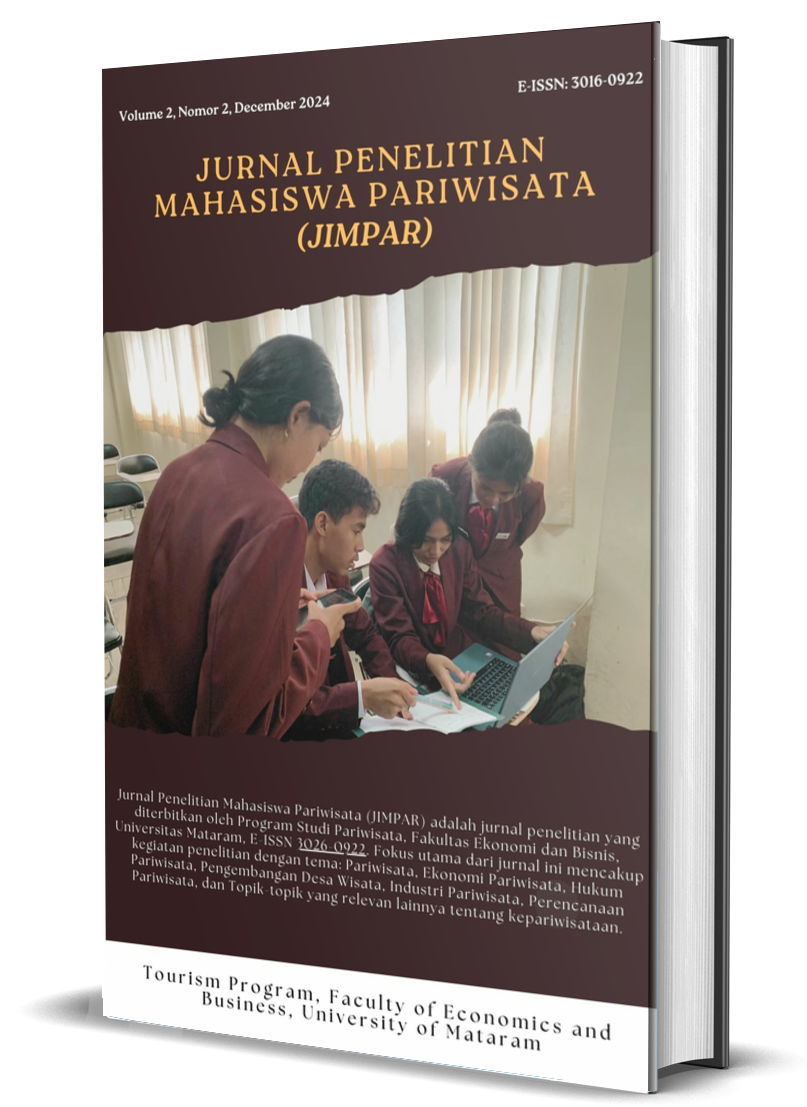Implementation of Community Based Tourism in Kebon Ayu Cultural Tourism Village, West Lombok District, West Nusa Tenggara Province
Kata Kunci:
Tourism Village, Community-Based Tourism, Kebon Ayu Cultural Tourism Village, Socio-Economic CommunityAbstrak
West Nusa Tenggara (NTB) Province, especially on Lombok Island, has a lot of tourism potential including tourist villages. There are 59 tourist villages that have been established by the NTB Provincial Government, which are spread across 5 (five) districts/cities on Lombok Island. One of the tourist villages that is currently developing is Kebon Ayu Cultural Tourism Village in West Lombok District. Kebon Ayu Cultural Tourism Village is one of the tourist villages that has won the Indonesian Tourism Village Award in 2023. Using a qualitative approach, this research aims to describe the implementation of the concept of community-based tourism in Kebon Ayu Cultural Tourism Village. Kebon Ayu Cultural Tourism Village has applied the principles of Community Based Tourism (CBT) management in managing tourism in the village. This can be seen from the involvement of the community since the mapping of the potential owned by the village to the establishment, management, and development of tourist attractions offered in the village. The impact of this involvement is the number of MSMEs formed and the opening of employment opportunities for the community in the village itself, resulting in socio-economic changes in the community. However, the lack of assistance in the form of education from stakeholders makes Human Resources (HR) related to tourism in Kebon Ayu Cultural Tourism Village still low and makes the management of tourist villages less optimal.
Referensi
Arifin, A. P. R. (2017). Pendekatan community based tourism dalam membina hubungan komunitas di kawasan Kota Tua Jakarta. Jurnal Visi Komunikasi, 16(01), 111-130.
David, J., & Rosanto, S. (2023). Analisa Penerapan Community Based Tourism Pada Desa Wisata: Kampung Wisata Kreatif Cigadung, Jawa Barat. Jurnal Syntax Fusion, 3(08), 809-823.
Dewi, M. H. U. (2013). Pengembangan desa wisata berbasis partisipasi masyarakat lokal di Desa Wisata Jatiluwih Tabanan, Bali. Jurnal Kawistara, 3(2).
Febrian, A. W., & Suresti, Y. (2020). Pengelolaan wisata kampung blekok sebagai upaya peningkatan ekonomi masyarakat berbasis community based tourism kabupaten situbondo. Jurnal Administrasi Bisnis, 9(2), 139-148. https://doi.org/10.14710/jab.v9i2.25308
Fifiyanti, D., Taufiq, M. L., & Ermawati, K. C. (2023). Penerapan Konsep Community Based Tourism Dalam Pengembangan Desa Wisata Burai. Jurnal Industri Pariwisata, 5(2), 201-208.
Gamal, Suwantoro. 2002. Dasar-dasarPariwisata. Penerbit Andi.
Krisnani, H., & Darwis, R. S. (2015). Pengembangan desa wisata melalui konsep community based tourism. Prosiding Penelitian Dan Pengabdian Kepada Masyarakat, 2(3).
McIntosh Robbert. (1980). W. Torism: Priciple, Practise, Philosophies, Grid Publishing, Inc.
Muallisin, Isnaini. 2007. Model Pengembangan Pariwisata Berbasis Masyarakat di Kota Yogyakarta. Jurnal Penelitian Bappeda Kota Yogyakarta Edisi No.2, Desember 2007
Murphy, P.E. 1985. Tourism: A Community Approach. London: Methuen
Pearce, D. 1995. Tourism a Community Approach. 2nd; Harlow logman
Prayogi, P. A., Suthanaya, I. P. B., & Sari, N. L. K. J. P. (2022). PengelolaanDesaWisata Pengelipuran Dengan Konsep Green Economy Berbasis Masyarakat Lokal Di Era Pandemi Covid-19. Journal of Applied Management and AccountingScience, 3(2), 117-127.
Singandaru, Adhitya Bagus., Ida Ayu Putri Suprapti. (2024). Teknik Penulisan Karya Tulis Ilmiah. ISBN 9786234733518. Cetakan Pertama. Madani Berkah Abadi. Yogyakarta.
Suansri, Potjana. 2003. Community Based Tourism Handbook. Thailand : REST Project.
Saryono. (2010). Kualitatif Research Design: Filosofi, Metodologi, dan Aplikasi. Pustaka Pelajar.
Suhaimi, S. N., Putri, T. A., Harahap, A., & Furqan, A. (2024). ANALISIS PENERAPAN COMMUNITY BASED TOURISM (CBT) DI DESA WISATA MEKARSARI, KABUPATEN BANDUNG. Jurnal Industri Pariwisata, 6(2), 160-173.
Sulaiman, I. M. (2021). Penerapan konsep community based tourism (cbt) pada Pantai Tanjung Bias di Dusun Karang Telage Desa Senteluk Kecamatan Batu Layar Kabupaten Lombok Barat Provinsi Nusa Tenggara Barat (Doctoral dissertation, UIN Mataram).
Syarifah, R., & Rochani, A. (2021). Studi Literatur: Pengembangan Desa Wisata Melalui Community Based Tourism Untuk Kesejahteraan Masyarakat. Kajian Ruang, 1(1).
Syarweni, N., Latianingsih, N., Mariam, I., & Shiva, N. (2022, December). Mempersiapkan Sebuah Desa Wisata. In Seminar Nasional Riset Terapan (Vol. 11, No. 01, pp. 385-389).
Tandilino, S. B., & Meko, P. M. (2020). Penerapan Community Based Tourism Di Desa Wisata Lamalera B Dalam Mendukung Pariwisata Estate Di Nusa Tenggara Timur. TOURISM: Jurnal Travel, Hospitality, Culture, Destination, and MICE, 3(1), 14-25.
Timothy, D. J. (1999). Participatory planningA view of tourism in Indonesia. Annals of tourism research, 26(2), 371-391.
Undang-undang (UU) Nomor 10 Tahun 2009 tentang Kepariwisataan
Utami, V. Y., Yusuf, S. Y. M., & Mashuri, J. (2022). Penerapan Community Based Tourism Dalam Pengembangan Pariwisata Berkelanjutan Sebagai Upaya Pemberdayaan Sosial Ekonomi Masyarakat. TheJournalish: Social and Government, 3(3), 219-226.
Wearing, S.L. and Donald, Mc. 2001. “The Development of Community Based Tourism: Re-Thinking The Relationsgip between Tour Operators and Development Agents as intermediaries in rural and isolated area Communities,” Journal of Sustainable Tourism.
Yachya, A. N., & Mawardi, M. K. (2016). Pengelolaan kawasan wisata sebagai upaya peningkatan ekonomi masyarakat berbasis CBT (community based tourism). Studi Pada Kawasan Wisata Pantai Clungup Kabupaten Malang). Universitas Brawijaya. Malang.
Yoeti, Oka. 1997. Perencanaan dan Pengembangan Pariwisata. Jakarta : PT Pradnya Paramita
Unduhan
Diterbitkan
Cara Mengutip
Terbitan
Bagian
Lisensi
Hak Cipta (c) 2024 Jurnal Penelitian Mahasiswa Pariwisata

Artikel ini berlisensiCreative Commons Attribution-ShareAlike 4.0 International License.








